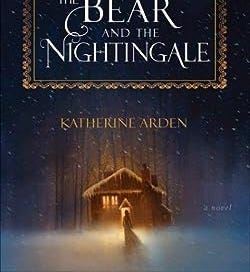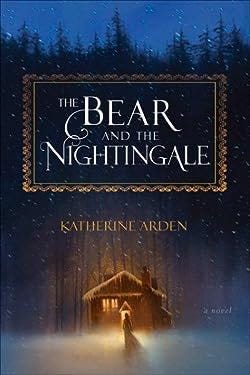Katherine Arden’s The Bear and the Nightingale makes itself out to be a Russian winter fairytale, mixing together medieval Russia with its folktales come to life, and one magical girl in the center of it all to save the day. The reviews are mostly rapturous: “stunning,” “utterly bewitching,” “haunting and lyrical,” “enthralling and enchanting;” there is no end to the praise. And so when my book club and I chose it for our February read, we had no idea just how disappointing it would turn out to be.
The idea of a fairytale retelling was what initially sold us on the book. Fairytales and myths retold are a delight to read when done well, able to make powerful new connections by rearranging a familiar tale with an unfamiliar setting, characters, or plot. And while this story does begin with the Russian fairytale that it is based on, it seemed to frequently lose its hold on that central story and get distracted by a myriad of other things, much to its detriment.
It starts out with promise. We are introduced to the family, to the various children and their personalities, their father Pyotr who is strong and capable, the nurse Dunya who tells them fairytales and keeps the household in order, and their mother who bears a final child, destiny hanging heavy over her, and then dies. This child, Vasya, becomes the central character in the story, and when we read the old fairytale of an elder daughter who is taken as a bride to the Winter King by her evil stepmother’s jealousy and survives to be brought home with great wealth, only to have her younger stepsister be forced to try the same tactic and perish, all the pieces seem to be in place for an interesting and compelling read.
But as Part One continues, more and more threads get introduced into the story that begin to get hopelessly tangled. One older brother decides to become a monk, against his father’s wishes. Pyotr, the father, is forced to take the mad daughter of the Grand Prince in Moscow as his wife, as the Grand Prince schemes to get her out of the way. Pyotr’s oldest daughter weds the prince’s cousin in another political move to do away with him, and a new priest comes to serve them who was also getting too popular and thus too politically dangerous for the Moscow rulers (one has to wonder if they couldn’t spread their political rivals a bit more thinly than this). All this political maneuvering feels important at the time, but does not come back into the story again. All of these threads are just dropped, seemingly forgotten in the mire of the story1. And while in Moscow, Pyotr is given a mysterious pendant by a mysterious and suspicious stranger, and made to promise to give it to Vasya on pain of his son’s death. And yet, years go by before the pendant is ever actually given, and seemingly they’re all none the worse for it.
Then the story takes a turn towards horror. The new stepmother, Anna, can see demons everywhere she goes. Vasya, our young protagonist, can also see them, but she knows them as the sprites who guard over different realms: the house, the stables, the river, the forest. The new priest, Konstantin, decides that he himself is the savior of these backwards peasants and will rescue them from the devils that fill their life. Thus is introduced the clash between Christianity and the old pagan religions. What happens when the old ways die in the face of the revelation of Christianity? This question had potential, and I was interested to see how it would be worked out within the novel. It turns out, it was simply disappointing. The priest is an egoist with no time for the humanity of others, and a strange lustful fascination with Vasya (who, it must be mentioned, is still a child). He’s also ridiculously naive, and by his foolishness he brings about almost all of the evil in the novel. This sets Christianity, or at least her priests, in direct opposition to the good in the story. The hope that the older brother who becomes a monk early on might temper this somewhat was ill-founded, as he simply disappears from the story once he makes his decision. The spirits themselves, while not all good or all bad, are essential to the life of the community, and their extinction becomes one of the greatest threats of the novel. And while it would be nice to read this as an expression of how fairytales can live alongside the True Myth of Christianity, instead it simply comes across as if it would be better for them all if Christianity was simply not present. At no point in the whole story does the Christian God appear to be present, capable, interested, or available. Prayer never seems to avail the characters of anything, and Vasya herself seems pretty skeptical of everything about the church.
Part Two felt less like a fairytale, and much more like a horror film. The demon/sprite subplot was confusing and unsettling, Konstantin’s lusting over Vasya was creepy, and when the vampire/undead Upyr creatures show up out of nowhere, we all questioned whether we even wanted to continue reading. Not only did these undead creatures move the book from feeling like a fantasy novel to feeling like your average horror film, there was also no real buildup, and the stories about them that the nurse Dunya apparently told around the fire (including about how to kill them), are completely absent from the narrative. At this point people are dying left and right, the winter is the worst anyone can remember, a very powerful demon has Konstantin under his control, and Vasya is running around stabbing the undead with wooden stakes while everyone around her views her as a mad witch. And no, none of this feels related to the original fairytale the book is premised upon.
Then, finally, the Frost King shows up, takes Vasya to his house, and things seem to come back around. If the book had had more to do with the Frost King it would have been much more compelling, as this was one of the best parts of the book. However, this whole book struggles from a pacing perspective, and this was no exception. The sections with the Frost King are short, the climax feels rushed and contrived, and even the background of the Frost King and his evil brother is glossed over with just a few words. Despite a lot of the book feeing overwritten, the important bits at the end felt like an afterthought. In the end, you’re mostly left with a feeling of disappointment and bewilderment.
For all of this, there are a few things done well in this book. The setting was well crafted, the cold of the Russian winter set the mood well, the Frost King was intriguing, and the original fairytale compelling. However, the pacing was poor: too many years pass by in Part One, too many things happen that have no bearing on the story, and the ending felt ridiculously rushed. Much of the writing could have been tightened up. The themes of Christianity against the old world, and the place of women in the medieval era, which could have made for a very interesting story, were handled in a very disappointing and somewhat cliche way. Do we need another heroine who proclaims “I am told how I will live, and I am told how I must die. I must be a man’s servant and a mare for his pleasure, or I must hid myself behind walls and surrender my flesh to a cold, silent god. I would walk into the jaws of hell itself, if it were a path of my own choosing.” For a story purporting to be set in a well-researched medieval Russia, this sounds remarkably modern.
While I don’t recommend this book, there are many elements in it that reminded me of other books I enjoyed much more. If you’re looking for an icy cold myth that brings winter to life and asks questions of faith and family and love, try The Winter King instead. If you’re looking for a well researched look into medieval life and a moving, powerful consideration of all that that means for women and their roles, try Kristin Lavransdatter. If you want the medieval world but specifically in Russia and focusing on medieval Russian Christianity, try Laurus. If you’re looking for a consideration of the clash between the Christian and the pagan worldview, and the complications that arise from that clash, try Things Fall Apart. And if you’re looking for a great fairytale set in the real world, complete with magic, mysterious creatures, and a far-away culture and time period, try The Sinking City.
I know this is the first book in a trilogy, and so theoretically these things could come back around then. However, the book itself doesn’t say it’s part of a trilogy and just describes itself as “a novel,” which means it ought to be able to be self contained enough to not drop in SO MANY threads that lead nowhere.





I read this many years ago while living in Eastern Europe. I didn’t hate it at the time but looking back think of it as very forgettable. I’ve now read so many better books with related themes, some same and some different from your recommended list!
Thanks for the review! And also for the recommendations. KL and Laurus are excellent, so the others must be, too!